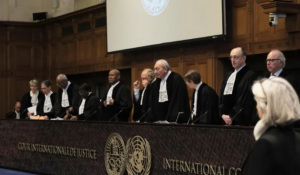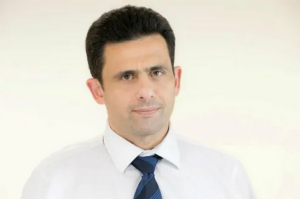Israel’s new judge at ICJ slammed genocide hearing as ‘intellectually dishonest’

Israeli Ad Hoc Judge Aharon Barak, centre right, at the opening of the genocide hearing at the International Court of Justice in The Hague
Chen Maanit reports in Haaretz on 2 July 2024:
The government has named its next representative as an ad hoc judge at the International Court of Justice hearing on South Africa’s genocide petition against Israel.
Prof. Ron Shapira, the rector of the Peres Academic Center, will replace former chief justice Aharon Barak, who stepped down last month, citing personal and family reasons. Shapira, who served as a member of the advisory committee of the Israel Law and Liberty Forum, a right-wing body that trains conservative jurists and judges, has been touted as a possible Supreme Court appointee by the current government, which hopes to appoint a conservative judge.
In January, after Barak’s appointed to the proceedings in The Hague, Shapira took to Facebook to slam the ICJ. Barak was sent by the State of Israel, he wrote, to serve as a judge “on a body that almost all the Jewish residents of the State of Israel and its entire political leadership deem to be unworthy of any degree of trust.”
Shapira also wrote at the time that, “the consensus in Israel is that this body [the ICJ] illustrates and amplifies all the flaws of the legal discourse, wherever it may be – intellectual dishonesty, manipulative use of ambiguous definitions, overly clumsy tools for fact-checking and refuting lies and disguising the judges’ own external interests in words that give a false impression of neutrality.”
In an interview with Ilana Dayan on Channel12, Shapira said that there was no need to establish a state commission of inquiry into the events of October 7.
In March 2023, at the height of protests against the government’s judicial overhaul, Shapira wrote an op-ed for Globes, in which he came out against demonstrators blocking roads. “Deliberately causing harm to millions of people for an entire day is an act of violence which is not required or desirable in order to express a political position.”

Prof. Ron Shapira
He had earlier stated that view in an interview on Arutz Sheva in February. “In a certain way [the protests] raise the bar for both sides and make it more difficult to conduct quick negotiations. One of the main reasons, in my opinion, that the negotiations are now stuck is on the one hand the protests and on the other the reaction to the protests. The accelerated legislative process is to some extent a reaction to the protests,” he said.
Shapira spoke out in favor of reforming the judicial system and defended the government’s planned changes to the composition of the judicial appointments committee. “Israel certainly needs some kind of reform,” he told Arutz Sheva, accusing the Supreme Court of judicial overreach. “Almost nowhere else [in the world] do courts have the authority to overturn laws while judicial appointments are not under the control of the political system,” he said. In Israel, “a judge is not chosen by the public, not directly or indirectly… That isn’t an accepted system in Western countries.”
In the same interview, however, Shapira added that he opposed other elements of the judicial overhaul legislation, such as elimination of the reasonableness standard and the terms of the proposed judicial override law. “The override issue is a way for creating dialogue between the branches of government… It makes sense in a place where there is an organized and detailed constitution that enshrines human and citizen rights.”
This article is reproduced in its entirety
